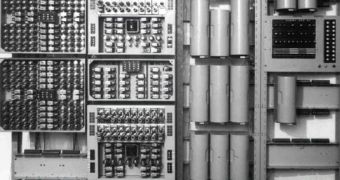It turns out that, even in the 1950s, people were starting to grow out of their habit of believing that all witches were evil, since it is doubtful that they would have used the word as the name of one of the first digital computers.
Most computers made over half a century ago are well and truly gone, but there is one that can still be saved.
At least this is what researchers at the National Museum of Computing (TNMOC) in the UK firmly believe. Or perhaps we should say they refuse to believe anything else.
Kevin Murrell has stumbled upon photos of it by pure chance, learning that the system was in storage at what was left of the Museum of Science and Industry in Birmingham.
As a TNMOC trustee, he excavated all the components, after seeing some old photographs. They were dirty, but mostly unscathed. It took the past three years to put it back together.
“The Witch” was activated in the 1950s and was used by scientists as part of Great Britain’s atomic research initiative.
Obviously, the 2.5-tonne system eventually became outdated. What did not happen was a complete teardown.
Apparently, The Witch is still mostly intact, so the folks at the aforementioned museum figured their exhibit could do with such a piece of history.
Originally, The Witch was known as Harwell Dekatron and, after the atomic initiative was done with it, the large computer was transferred to Wolverhampton University, where its current name was chosen.
Witch stands for Wolverhampton Instrument for Teaching Computing from Harwell. Eventually, a donation occurred, in 1983, to the Museum of Science and Industry in Birmingham.
Later, in 1997, the museum was closed. The Witch was dismantled and put in storage, where it stayed until a few years ago, when Murrell found it.
The restoration process was able to keep most of the original parts, in time for today's grand debut in a ceremony at Bletchley Park (November 20, 2012). Sure ,The Witch is horrendously weak compared to today's personal computers, let alone supercomputers, but it is still history.

 14 DAY TRIAL //
14 DAY TRIAL //